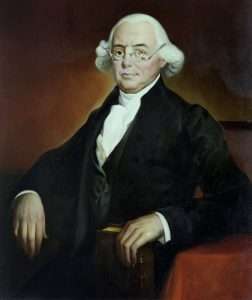The Volokh Conspiracy
Mostly law professors | Sometimes contrarian | Often libertarian | Always independent
Today in Supreme Court History: October 28, 1787
10/28/1787: James Wilson gives speech to the Pennsylvania ratification convention, arguing that there was no need for a Bill of Rights.

Editor's Note: We invite comments and request that they be civil and on-topic. We do not moderate or assume any responsibility for comments, which are owned by the readers who post them. Comments do not represent the views of Reason.com or Reason Foundation. We reserve the right to delete any comment for any reason at any time. Comments may only be edited within 5 minutes of posting. Report abuses.
Please to post comments


Good read although I don't see him discussing Bill of Rights issues.
https://teachingamericanhistory.org/document/speech-to-the-pennsylvania-conventions-afternoon/
None of you lawyers seem to be able to read their clear English language. You are little tyrants, and in total failure in any of the goals of any law subject. You stink.
Thank God he said something. We need the BoR, today more than ever.
As Roger Sherman put it, “The State Constitutions are not repealed by the Federal Constitution, and being in force are sufficient. Enumerating certain rights implies that those not listed are extinguished.”
Sherman's view is conclusively refuted by decisions finding rights to abortion, gay marriage, contraception, and others not enumerated. While in theory Sherman may have had a point, that's not what actually happened.
Those rights came about because they were seen as extensions of rights that are enumerated, such as the right to be free of unreasonable searches and seizures, and equal protection (a right which was enumerated later). With the exception (since 2008) of the Second Amendment, both the courts and the people have adapted their understanding of those rights to their sense of right and wrong and the realities of today’s society.
Try telling that to an originalist.
Depends on the originalist, as Baude showed me.
I hate to interrupt the mutual self-congratulation, but
"both the courts and the people have adapted their understanding of those rights to their sense of right and wrong and the realities of today’s society"
Why *the courts* and the people?
Why not just the people?
The people or their legislative representatives can pass the laws they deem suited to today's society, and the courts can allow those laws to take effect.
So there's your adaptation right there.
Or do you want the courts to push back against the people if the people deny some vital right (like abortion)?
But how can the courts legitimately block rule by the people?
Maybe they're aristocrats and can serve as a check on the impulses of the masses, harumph, harumph.
Or maybe there are laws constraining both the courts and the people? No, that wouldn't work unless we proclaim the laws to be so vague that we need an aristocratic class to discern the laws' spirit and use that against the popular will.
Sort of tangential, but this reminds me of an interesting discussion I had with some federal clerks once: would you rather have only the odd amendments or the even ones? I believe I settled on the evens because I figured you could get the a lot of the odds' guarantees from the Fourteenth Amendment. Although prohibition would suck, so maybe that wasn't the best choice....
Yeah, we need booze, LTG. 100%, no debate. 🙂